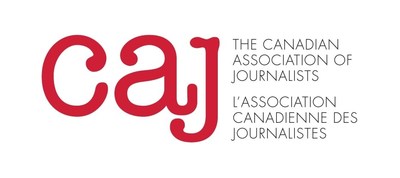CAJ: Police must stop attacking journalists covering protests in the U.S
OTTAWA, June 1, 2020 /CNW/ - The Canadian Association of Journalists (CAJ) is outraged after hearing CBC journalist Susan Ormiston's report that U.S. police shot at her with rubber bullets and Radio-Canada journalist Philippe LeBlanc's report that police slashed his tires. Both journalists were reporting on protests sweeping across the country in the wake of George Floyd's death.
"Some officers are purposely injuring reporters. It's positively nightmarish; they are out of control," says CAJ president Karyn Pugliese. "We're not armed and we're not dangerous, unless you believe the truth is dangerous. So, I'm begging police, please stop."
These are not the only Canadian reporters who have had problematic interactions with police while covering the protests. Barbara Davidson, a Pulitzer-prize winning photojournalist, said she was pushed from behind by police after identifying herself as a journalist.
"I was hit so hard that I went flying before crashing to the ground and hitting the back of my head on a fire hydrant. Protesters picked me up, preventing me from being crushed," tweeted Davidson.
Many reporters have been injured and arrested while covering the protests. Linda Tirando, a freelance journalist who has written for the Guardian, was blinded in one eye after being struck with what she believes was a rubber bullet. Last week, Canadian journalists collectively watched with utter dismay as CNN journalist Omar Jimenez was arbitrarily detained by the Minneapolis police force.
As Minnesota's Gov. Tim Walz stated in a press conference held on Friday, the arrest was "inexcusable" and "we have got to ensure that there is a safe spot for journalism to tell this story." While that kind of full-throated apology is welcomed, authorities must do more to keep journalists safe.
The CAJ supports the Committee to Protect Journalists' call that authorities across the United States tell police not to target journalists.
"Journalists never want to make ourselves the centre of a story, but we're seeing oppression of media that is unheard of in a democratic society. Every citizen is relying on media to be their eyes and ears during this crisis. Let us do our job," says Pugliese.
Canadian authorities, too, need to do more to protect journalists.
At its annual awards ceremony (held virtually) on Saturday evening, the CAJ recognized three of the journalists who were either detained, removed or threatened with arrest by the RCMP in the course of doing their jobs in Wet'suwet'en.
Photojournalists Amber Bracken and Jesse Winter, as well as reporter Jerome Turner, were honoured with the association's highest honour - the Charles Bury Award - which is given under circumstances of exceptional merit to those who have made a significant contribution to Canadian journalism.
"Having guns pointed at you is something that was novel for me, in life in general, but I was honoured to be there and honoured to have some sort of public record," Turner said while accepting the award.
The CAJ is monitoring reports of Canadian journalists facing issues with the police, regardless of what country they're in. Incidents can be shared with [email protected].
The Canadian Association of Journalists is a professional organization with more than 600 members across Canada. The CAJ's primary roles are public-interest advocacy work and professional development for its members.
SOURCE Canadian Association of Journalists
News published on and distributed by:




